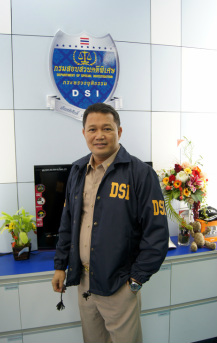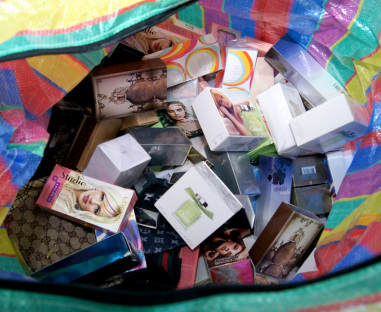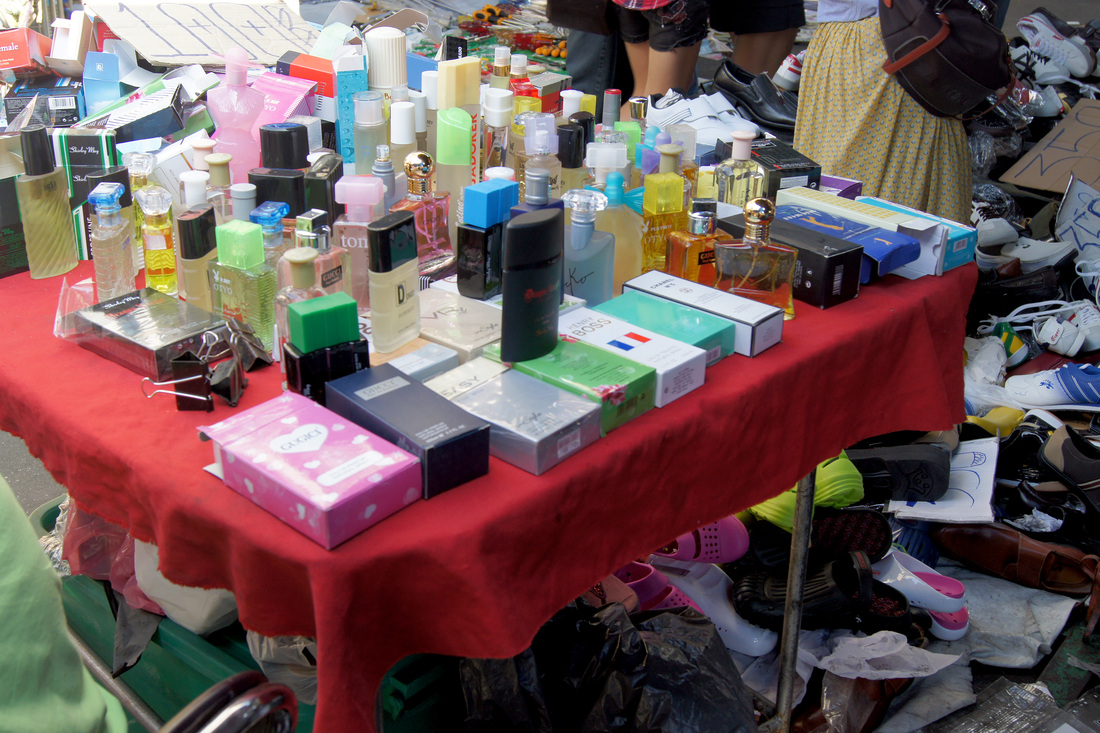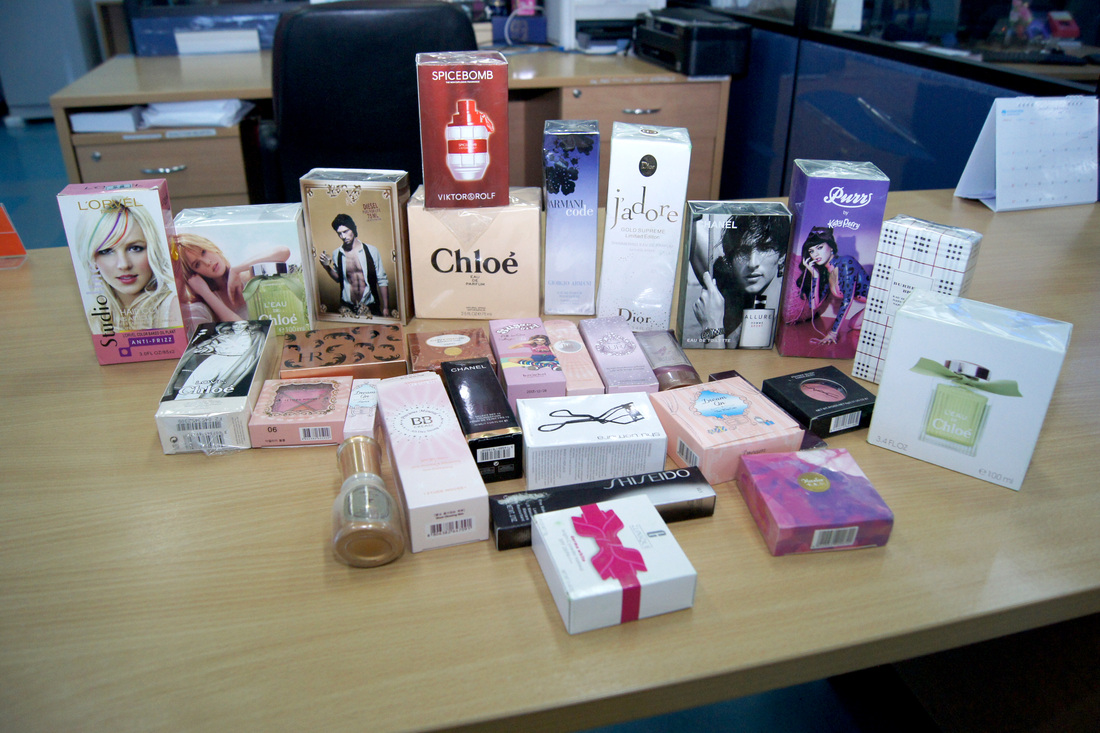How the Department of Special Investigation plans to come down hard on manufacturers and distributors of fake cosmetics and perfumes in Bangkok
By Maxmilian Wechsler
By Maxmilian Wechsler
| WITH a guaranteed market of millions of women, the beauty products industry in Thailand is huge. Cosmetics, lotions and perfumes under top name brands are widely available in shops, malls, and markets across the city – sometimes for prices that seem too good to be true. Before you go snatching a bargain, though, consider what’s in the bottle: It may be fake and possibly even dangerous. Fake cosmetics and perfumes of famous foreign brands have been sold at shops, markets and on the streets for decades, and more recently on the internet, for a fraction of what the genuine products sell for in a reputable department store. |

Police Lieutenant Colonel Chinnachot Daengsurisri
The unscrupulous sellers are sometimes raided by the police, but they are usually charged with trademark violation, given a light fine and are back in business in a matter of days or even hours. The police rarely conduct follow-up investigations, for example to identify and arrest the distributers or locate factories and warehouses.
This is changing with the Department of Special Investigation (DSI) stepping in. DSI is a civilian law enforcement agency under the Ministry of Justice, fashioned after the US Federal Bureau of Investigation.
Police Lieutenant Colonel Chinnachot Daengsurisri, who has been with the DSI eight years and became director of its Bureau of Intellectual Property Crimes in April last year, says he is determined to suppress not only the sale of fake beauty products but all intellectual property crimes throughout Thailand. Since he took up his new position the bureau has conducted several significant operations and he says more are on the way.
“We will continue to bust the dealers and makers of fake cosmetics and perfumes because they are a health hazard and give Thailand a bad name. I would like to urge consumers to think about the lack of quality and the danger these products pose, and not support the criminals,” said Pol Lt Col Chinnachot.
“In one of our more significant operations, on December 12, we simultaneously raided three warehouses in Pathum Thani province (adjacent to Bangkok) together with one large shop in Talard Mai (New Market) located opposite Don Mueang Airport. We seized 25,656 items worth around 30 million baht. This amount is estimated from the price of the fake products. We arrested one Thai male who is suspected of being the mastermind,” said Pol Lt Col Chinnachot. “We are targeting the very top of the chain now.”
The raids were carefully planned following weeks of investigation and conducted simultaneously by 20 DSI officers. They seized counterfeit cosmetics and perfumes of foreign brands that included Burberry, Chanel, Clinique, Gucci, Lancome, Maybelline, Olay, Shiseido and SK-II, and Thai brands such as Nitipon, Wuttisak and Yanhee.
The man arrested is believed to be linked to two websites offering these fake products which received a huge number of visitors. The merchandise was sent to the customers by post. One website is still active, but famous foreign and Thai brands of cosmetics and perfumes are no longer offered, while the other one has been shut down.
“The suspect has been initially charged with trademark violation,” said Pol Lt Col Chinnachot. “But in contrast to previous cases conducted primarily by the police, we have sent samples of the seized items to the laboratory for examination. If prohibited or dangerous substances are found we will also charge the suspect with offences under the 1992 Cosmetic Act. It takes approximately two months to get results from the laboratory.
“Furthermore, in this particular case the investigation is ongoing − we are trying to get more information from the suspect and are looking at his assets and financial transactions to see if money laundering charges can be brought against him. We are also investigating whether the suspect should be charged with tax avoidance. We will investigate the case in any way possible, and this should discourage others from dealing with these and other fake items.”
The DSI bureau chief said counterfeit cosmetics and perfumes can be extremely dangerous because they often contain chemicals that can damage the skin and even cause cancer. “They are distributed wholesale or retail at various shops around Thailand or on the internet. At present, there are many outlets where the counterfeits are sold, many in tourist areas.
“In most cases the dealers admit to selling fake watches, clothes, bags or pirated CDs and DVDs, but this is not the case with cosmetics and perfumes. The dealers claim they are genuine products, although they sell them much cheaper.
But how can consumers spot a fake?
“You can identify fake beauty products and fragrances in three ways,” explained Pol Lt Col Chinnachot. “The first and easiest way is by the price. If it seems too low then it must be a fake. No one can sell genuine Gucci or Chanel perfume for 100 baht a bottle. Don’t listen to the sellers’ reasons why it is so cheap, like it has been smuggled and no tax has been paid or they are giving a special discount for some reason.
“Second, every item should have a sticker of approval from the Food and Drug Administration or it can’t be sold in Thailand. And third, every product sold in Thailand is required to have stickers detailing, in Thai, what chemicals and ingredients make up the item, which the fakes don’t have.
“Consumers should buy from well established department stores like Central, Siam Paragon, Emporium and others. Genuine brand name cosmetics and perfumes are not sold on the street,” stressed Pol Lt Col Chinnachot.
“According to our investigations,” he continued, “fake products are generally made in China and smuggled to Thailand, although some are made locally.”
The BigChilli learned from various sources that the raids on December 12 surprised counterfeiters, and not only the ones dealing with cosmetics and perfumes, because it signaled DSI’s desire to target counterfeiting masterminds instead of only “small fish.”
This is changing with the Department of Special Investigation (DSI) stepping in. DSI is a civilian law enforcement agency under the Ministry of Justice, fashioned after the US Federal Bureau of Investigation.
Police Lieutenant Colonel Chinnachot Daengsurisri, who has been with the DSI eight years and became director of its Bureau of Intellectual Property Crimes in April last year, says he is determined to suppress not only the sale of fake beauty products but all intellectual property crimes throughout Thailand. Since he took up his new position the bureau has conducted several significant operations and he says more are on the way.
“We will continue to bust the dealers and makers of fake cosmetics and perfumes because they are a health hazard and give Thailand a bad name. I would like to urge consumers to think about the lack of quality and the danger these products pose, and not support the criminals,” said Pol Lt Col Chinnachot.
“In one of our more significant operations, on December 12, we simultaneously raided three warehouses in Pathum Thani province (adjacent to Bangkok) together with one large shop in Talard Mai (New Market) located opposite Don Mueang Airport. We seized 25,656 items worth around 30 million baht. This amount is estimated from the price of the fake products. We arrested one Thai male who is suspected of being the mastermind,” said Pol Lt Col Chinnachot. “We are targeting the very top of the chain now.”
The raids were carefully planned following weeks of investigation and conducted simultaneously by 20 DSI officers. They seized counterfeit cosmetics and perfumes of foreign brands that included Burberry, Chanel, Clinique, Gucci, Lancome, Maybelline, Olay, Shiseido and SK-II, and Thai brands such as Nitipon, Wuttisak and Yanhee.
The man arrested is believed to be linked to two websites offering these fake products which received a huge number of visitors. The merchandise was sent to the customers by post. One website is still active, but famous foreign and Thai brands of cosmetics and perfumes are no longer offered, while the other one has been shut down.
“The suspect has been initially charged with trademark violation,” said Pol Lt Col Chinnachot. “But in contrast to previous cases conducted primarily by the police, we have sent samples of the seized items to the laboratory for examination. If prohibited or dangerous substances are found we will also charge the suspect with offences under the 1992 Cosmetic Act. It takes approximately two months to get results from the laboratory.
“Furthermore, in this particular case the investigation is ongoing − we are trying to get more information from the suspect and are looking at his assets and financial transactions to see if money laundering charges can be brought against him. We are also investigating whether the suspect should be charged with tax avoidance. We will investigate the case in any way possible, and this should discourage others from dealing with these and other fake items.”
The DSI bureau chief said counterfeit cosmetics and perfumes can be extremely dangerous because they often contain chemicals that can damage the skin and even cause cancer. “They are distributed wholesale or retail at various shops around Thailand or on the internet. At present, there are many outlets where the counterfeits are sold, many in tourist areas.
“In most cases the dealers admit to selling fake watches, clothes, bags or pirated CDs and DVDs, but this is not the case with cosmetics and perfumes. The dealers claim they are genuine products, although they sell them much cheaper.
But how can consumers spot a fake?
“You can identify fake beauty products and fragrances in three ways,” explained Pol Lt Col Chinnachot. “The first and easiest way is by the price. If it seems too low then it must be a fake. No one can sell genuine Gucci or Chanel perfume for 100 baht a bottle. Don’t listen to the sellers’ reasons why it is so cheap, like it has been smuggled and no tax has been paid or they are giving a special discount for some reason.
“Second, every item should have a sticker of approval from the Food and Drug Administration or it can’t be sold in Thailand. And third, every product sold in Thailand is required to have stickers detailing, in Thai, what chemicals and ingredients make up the item, which the fakes don’t have.
“Consumers should buy from well established department stores like Central, Siam Paragon, Emporium and others. Genuine brand name cosmetics and perfumes are not sold on the street,” stressed Pol Lt Col Chinnachot.
“According to our investigations,” he continued, “fake products are generally made in China and smuggled to Thailand, although some are made locally.”
The BigChilli learned from various sources that the raids on December 12 surprised counterfeiters, and not only the ones dealing with cosmetics and perfumes, because it signaled DSI’s desire to target counterfeiting masterminds instead of only “small fish.”
Market survey
Fake perfumes have a long history in Thailand. In the mid-1990s, for example, it wasn’t uncommon to see Thai salesmen wandering along Silom Road with small briefcases filled with brand name foreign perfumes. They would target female office workers and sell the bottles at 200-300 baht a pop, which was a bargain even then. They had a pitch that these perfumes had been smuggled to Thailand by air crews, which many people actually believed. I remember spraying a sample on my wrist and feeling an immediate stinging sensation which lasted a long time and resulted in a red rash.
Now these travelling vendors have been replaced by shops and stalls prominently displaying their wares in many tourist areas in Bangkok and in Chinatown. One stall at the busy Klong Thom Center has dozens of bottles under a sign reading ‘100 baht.’ In broken English and unconvincingly, the seller claimed that everything is original.
Some of the perfumes being sold on the street and in small shops have packaging that’s hard to distinguish from the genuine products sold at Bangkok’s leading department stores.
But the contents of these fake packages can differ greatly. A quick test of the fragrancies sold on the street resulted yet again in an itchy, red, and burning rash – just like the old days. Even after I washed my hands, where I’d sprayed the products, the sensation continued. Imagine if someone were to spray this stuff all over their body.
The scent of success
As a side note, around ten years ago I spoke with an executive of a famous French brand selling legitimate cosmetics and perfumes in Thailand. He told me that out of all the products sold by his and similar companies, perfumes bring the biggest profit margin, followed by sunglasses.
The man said that the cost to make a bottle of imported perfume was then around US$4-5, with the biggest expense actually being the packaging (bottle and box). The actual fragrance only cost the company then around US$1.
After doing a bit of research on the internet I found that his statements were, and still are, completely plausible. According to a report entitled “Behind the Spritz: What Really Goes Into a Bottle of $100 Perfume,” written last year by Barbara Thau for Dailyfinance.com, a prestige fragrance costs as little as US$2 to manufacture, while the packaging and bottle cost around US$10 collectively.
The fragrances are no longer made in a time-consuming process from essential oils as in the old days. Today what is bottled is the result of a much cheaper chemical synthesis, while the prices have stayed high.
With profits of the legitimate perfume industry in excess of US$25 billion a year, some might say the counterfeiters aren’t the only ones pulling the wool over customers’ eyes. Is it any wonder some women buy a genuine-looking bottle for 100 baht to show off to their friend?
The bottom line is: When you purchase a well-known foreign brand of perfume, you aren’t really paying for the fragrance but also for the brand name. You also get peace of mind that what’s in the bottle has been tried and tested and is safe to use on your skin.
Fake perfumes have a long history in Thailand. In the mid-1990s, for example, it wasn’t uncommon to see Thai salesmen wandering along Silom Road with small briefcases filled with brand name foreign perfumes. They would target female office workers and sell the bottles at 200-300 baht a pop, which was a bargain even then. They had a pitch that these perfumes had been smuggled to Thailand by air crews, which many people actually believed. I remember spraying a sample on my wrist and feeling an immediate stinging sensation which lasted a long time and resulted in a red rash.
Now these travelling vendors have been replaced by shops and stalls prominently displaying their wares in many tourist areas in Bangkok and in Chinatown. One stall at the busy Klong Thom Center has dozens of bottles under a sign reading ‘100 baht.’ In broken English and unconvincingly, the seller claimed that everything is original.
Some of the perfumes being sold on the street and in small shops have packaging that’s hard to distinguish from the genuine products sold at Bangkok’s leading department stores.
But the contents of these fake packages can differ greatly. A quick test of the fragrancies sold on the street resulted yet again in an itchy, red, and burning rash – just like the old days. Even after I washed my hands, where I’d sprayed the products, the sensation continued. Imagine if someone were to spray this stuff all over their body.
The scent of success
As a side note, around ten years ago I spoke with an executive of a famous French brand selling legitimate cosmetics and perfumes in Thailand. He told me that out of all the products sold by his and similar companies, perfumes bring the biggest profit margin, followed by sunglasses.
The man said that the cost to make a bottle of imported perfume was then around US$4-5, with the biggest expense actually being the packaging (bottle and box). The actual fragrance only cost the company then around US$1.
After doing a bit of research on the internet I found that his statements were, and still are, completely plausible. According to a report entitled “Behind the Spritz: What Really Goes Into a Bottle of $100 Perfume,” written last year by Barbara Thau for Dailyfinance.com, a prestige fragrance costs as little as US$2 to manufacture, while the packaging and bottle cost around US$10 collectively.
The fragrances are no longer made in a time-consuming process from essential oils as in the old days. Today what is bottled is the result of a much cheaper chemical synthesis, while the prices have stayed high.
With profits of the legitimate perfume industry in excess of US$25 billion a year, some might say the counterfeiters aren’t the only ones pulling the wool over customers’ eyes. Is it any wonder some women buy a genuine-looking bottle for 100 baht to show off to their friend?
The bottom line is: When you purchase a well-known foreign brand of perfume, you aren’t really paying for the fragrance but also for the brand name. You also get peace of mind that what’s in the bottle has been tried and tested and is safe to use on your skin.




 RSS Feed
RSS Feed
















